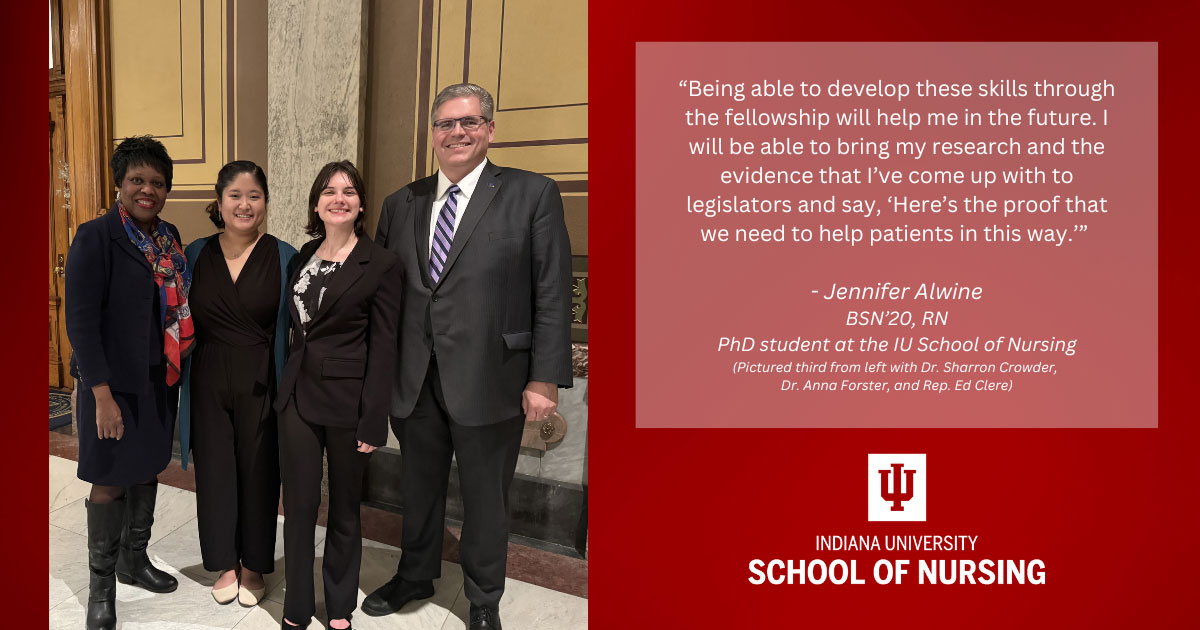Jennifer Alwine, BSN’20, RN, had a passion for taking action to promote people’s health but wasn’t sure how to use her voice and knowledge to help shape policies until she became a legislative fellow.
“I always knew that health policy and advocacy were a really important part of any healthcare professional’s career,” said Alwine, who is pursuing her PhD at the IU School of Nursing. “It’s really a major part of your role to advocate for your patients and for your profession, but I didn’t know how to do that.”
This is Alwine’s second year doing the legislative fellowship with Sharron Crowder, PhD’12, RN, ATSF, FAAN, and state Rep. Ed Clere of New Albany.
Dr. Crowder started the fellowship in 2014 alongside Rep. Clere after they were brought together by John Grew, the former Executive Director of State Relations and Policy Analysis at IU Government Relations. Dr. Crowder wanted to get nursing students involved in health advocacy and policy. During her time at the Statehouse, she saw students from other disciplines but noticed that nursing students were not represented.
“Our students should be able to engage in this type of fellowship so that they have exposure to policy and advocacy like other disciplines,” Dr. Crowder said.
Fellows spend a semester with Rep. Clere attending committee meetings and joining him for meetings with constituents, lobbyists and other stakeholders, as well as sitting on the floor during House sessions and participating in various events and other activities. The fellowship program is an opportunity for students like Alwine to take what they have learned in the classroom and apply it to real-life public policies.
Alwine has been a part of many meetings and conversations, giving her opportunities to educate legislators about the nursing profession and the importance of having nurses’ input in policymaking decisions.
“The fellowship is opening people’s eyes to the importance of having nurses at the table,” Alwine said. “It’s been an honor to remind people that nurses have a really important voice when it comes to people’s health.”
Alwine has also been inspired to share her experiences with other students and nurses. She created a toolkit to educate others on the legislative process and how they can get involved.
“Being able to share some of what I’ve learned has been a really cool and meaningful part of the whole process,” Alwine said.
Clere, who was the chairman of the House Public Health Committee from 2012-2015, recognized the importance of nurses’ voices and wanted to bring them into the fold.
"Dr. Crowder and I saw an opportunity to bring attention to what nurses have to offer as part of the legislative process, and to help graduate nursing students get involved," Clere said.
Clere says this program has helped him and his colleagues. Past fellows have helped during significant moments, such as the 2015 HIV outbreak in Austin and Scott counties when Clere authored a bill to start a syringe exchange program. Fellows were also present for legislation that directly impacted their career opportunities, such as the Nurse Licensure Compact legislation which Rep. Clere also authored. The compact allows Indiana nurses to practice in other states.
"I'm not the only one who benefits from nurses’ perspectives,” Clere said. “I can think of many times over the years when one of the fellows has been part of a meeting or conversation involving other legislators or other stakeholders and the fellow has contributed in a meaningful way to the discussion, and in so doing has contributed to the legislative process."
A 2021 focus group conducted with 10 of those who had been through the program indicated four benefits for students. They increased their enhanced knowledge of the legislative process, appreciated the immersion experience and mentorship, learned about health policy and advocacy roles, and helped increase other nurses' engagement in health policy and advocacy.
The first two fellows, Martha Cangany, BSN’90, MSN’96, DNP’14, RN, ACNS-BC, and Wanda Thruston, MSN’96, DNP’14, PNP, RN, have continued their health advocacy and moved into leadership and policy advising positions.
Cangany is currently the Director of Nursing Practice and Quality for Indiana University Health Adult Academic Health Center. She also works as a legal and healthcare consultant. Thruston has served on the Washington Township school board and currently works at the American Association of Colleges of Nursing.
Alwine’s goals for the future have been shaped by her experience as a legislative fellow. She plans to teach research and policy in a school of nursing. Research and policy were not initially on the table for her, she says, but the fellowship and health policy class have changed that.
“I love the idea of teaching people that you are capable of doing this, you are very smart people. You have all the skills, it’s just learning how to put it all together,” Alwine said.
She has already begun sharing her knowledge with other students in Dr. Crowder’s classes. Alwine hopes to show students who are apprehensive about getting involved with policymaking and advocacy that their involvement is important.
“I’ve been thoroughly convinced from this experience that we can’t sit back and do nothing because nothing’s going to get resolved that way,” she said.
Even after her fellowship, Alwine plans to stay active in health advocacy and feels better equipped to do so.
“Being able to develop these skills through the fellowship will help me in the future,” Alwine said. “I will be able to bring my research and the evidence that I’ve come up with to legislators and say, ‘Here’s the proof that we need to help patients in this way.’”


